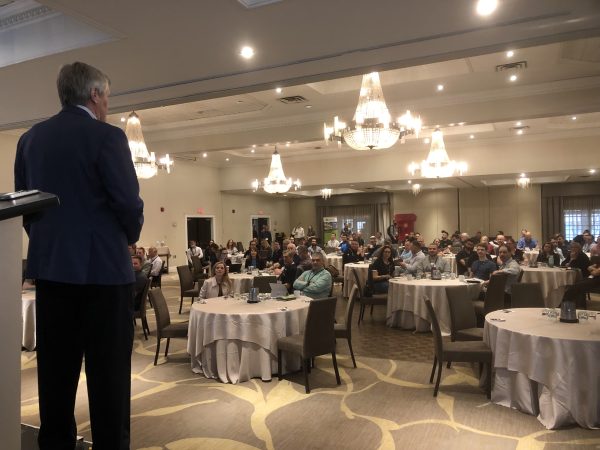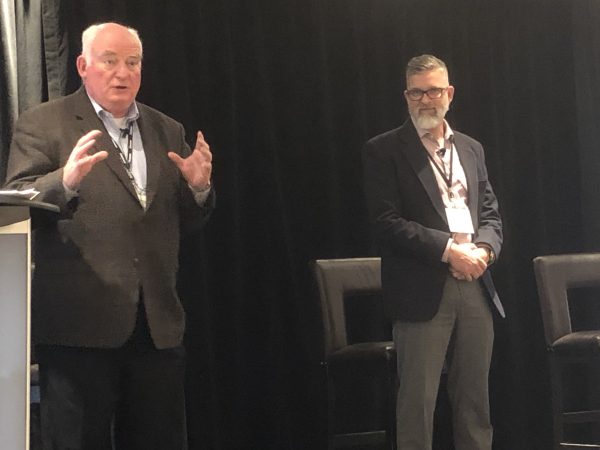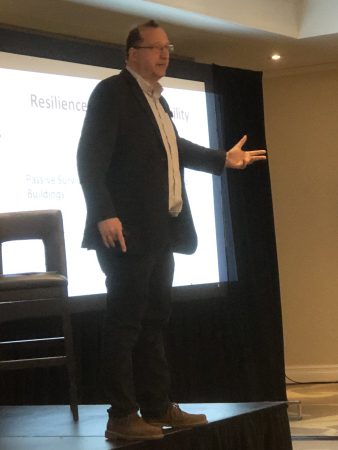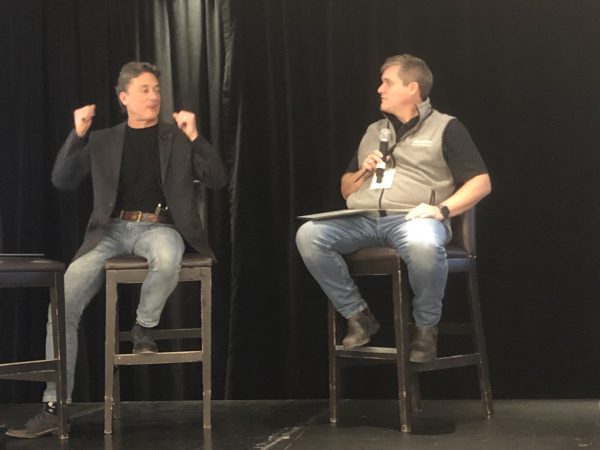
Patrick Flannery
Swimming in knowledge at Spring Training Camp
Canadian Contractor building science embodied carbon energy efficiency industry conference networking resiliency
About 150 contractors, government representatives, energy advisors and engineers attended.
Energy efficiency, resiliency and embodied carbon were the keywords at the Spring Training Camp, held April 25 and 26 at Hockley Valley Resort in Mono, Ont. The event welcomed about 150 paying guests for two very full days of building science discussion and education, with ample opportunities for mingling and networking around meals and after-hours social gatherings. Building Knowledge principals Gord Cooke and Andy Oding did a great job hosting with lots of energy, breezy comedy and a sharp eye on the clock. Tex McLeod of The McLeod Associates joined remotely from B.C. The audience was mostly custom home contractors with a large contingent of energy advisors and public servants from various relevant government agencies. A smaller group of manufacturers and engineers rounded out the group. Rachel Oding greeted guests, dealt with venue staff, wrangled swag and generally made the whole thing run smoothly. The Camp is a joint venture of The McLeod Associates and Building Knowledge, with support from Enbridge and the Canadian Wood Council.
Highlights from the presentations
There was too much in the content-filled days to cover comprehensively here, so we’ll just focus on some key takeaways.

Jim Moore (left) and Joe Starr of Beazer Homes told the group about their journey net zero building.
Jim Moore and Joe Starr of Beazer Homes, the 17th largest builder in the U.S., described their ongoing journey as a company to arrive at a place where they are only building net zero homes. They plan to get there by 2025 with such features as R60 insulation in attics, 24-inch R21 in walls, window U-factors of 0.28, 1.5 air changes per hour, 75 percent sensible heat recovery, ducts in conditioned space and a raft of other energy-efficient upgrades, all leading to homes that consume only 32 MMBtu per year, a 55 percent reduction from today. Moore in particular was a quote machine:
On building to a higher performance standard than required by code: “There’s value in being a leader, but you never want to get too far ahead. If you get too far ahead, you just don’t see the value for it.
On why Beazer decided to build high-performance homes: “We’re going to have to do it anyway. Why not get ahead of it?”
On why they move in three phased steps: “If we started talking about Phase Three now it’s like telling customers to wait three years and we’ll build you a better house.
On selling indoor air quality: “You know who is the most interested in indoor air quality? The customers. You know who is the least interested? The mechanical people.”
On how to sell better HVAC to people who don’t understand the certification labels: “I’ve found that when people are comfortable, people are happy, and beyond that I don’t care what form you give them.”
On marketing: “Fifty percent of the money spent on marketing is wasted. The hard part is telling which 50 percent.”
On keeping managers on board with the plan: “Every time we get a new division president he says ‘Why are we using all this expensive material?'”
Jeff Baker of WestLab joined the conference remotely to explain high-performance window technology, focusing mostly on explaining solar heat gain, how it is and is not related to energy efficiency and how glass coatings act to control it. Coatings can reduce solar heat gain by a factor of three versus clear glass. He expressed doubt that we will see further major advances in glass insulating value through improvements to coatings – in his view, we have gone close to as far as we can with this technology. People are often concerned that low-emmissivity coatings will darken the glass or change it’s colour; Baker pointed out that research has shown people’s brains automatically colour-correct what they see to what colour they expect it to be, and therefore glass can be tinted to a surprising degree before people will notice. Baker also explained insulating glass and how it works, mentioning that a shortage of krypton due to Elon Musk buying it for satellites and the war in Ukraine is making it too expensive to produce the most efficient window designs. He also advised against using the Hot 2000 code editor to produce energy efficiency values for windows as it has old values in it that don’t reflect the performance of today’s materials.
Possibly the most prosaic presentation came remotely from Gary Klein of Gary Klein Associates, who explained how to deliver hot water more efficiently and at desired pressures. Key takeaway: get that tank closer to where the water will be used. He threw cold water on recirculating pumps and insulating pumps and cautioned that heat pump water heaters need significant air space around them to work effectively without the coils freezing.

John Straube talked about resiliency and made it fun.
Ramtin Attar of Promise Robotics showed builders a future where manufacture of panelized components could be highly automated. So far, robots have only been found to economical when doing the repetitive tasks required to make high volumes of the same thing, such as in automotive manufacturing. Attar thinks technology has advanced to the point where processes could be flexible enough to address the semi-custom nature of panelized home construction – and could be feasible even for small builders with one-off designs. Promise Robotics is seeking builders who want to work with them to develop these processes.
John Straube of RDH Building Science brought a high level of energy and humour to his discussion of one of the big overarching topics of the conference: resiliency. With embodied carbon entering awareness as the next focus of environmentally friendly construction practices, forward thinkers are starting to call for designs and materials that last longer without the need for replacement or repair. In addition, more frequent extreme weather caused by climate change is forcing builders to consider upgrading their designs to be more resistant to such threats as floods, power outages, high heat and wildfires. Straube called for intelligent design for projects built in floodplains; backup power for sumps; better crawlspaces; power grid upgrades; less solar heat gain in windows; and exterior shading as measures to address these concerns. When it comes to wildfires, they key message was “don’t build in a forest.”

Mike Memme (left) and sidekick Andy Oding entertain with 10 Things That Keep Me Up At Night at Spring Training Camp
Mike Memme of Mountainview Building Group had the whole crowd laughing along as he presented the 10 things that keep him up at night with Andy Oding acting as Ed McMahon. The guy should really have his own late-night construction-themed talk show. But don’t get us wrong, there was a lot of substance there, too. Why doesn’t everyone do kickout flashing? How can we prevent truss uplift? Memme got serious talking about treating even nightmare customers as people who go through their day wondering why every interaction they have is a nightmare. He also had some strong political opinions, slamming city development departments for creating bizarre zoning requirements then leaving builders to clean up the mess when the department director leaves. Finally, Memme bemoaned consolidation in the industry, saying housing is becoming an oligopoly with everything being built by a few big companies, leaving small builders with no way into the market and customers with fewer choices and fewer ways to find unique designs. “More and more homes are being built by accountants and lawyers instead of the trades,” Memme said.
Hockley Valley was an excellent venue with great amenities and food, set in the picturesque hills just west of Toronto. Next year’s Spring Training Camp should be on everyone’s radar who wants to brush up their building science knowledge and meet some of the brightest minds in Canada’s construction industry.
